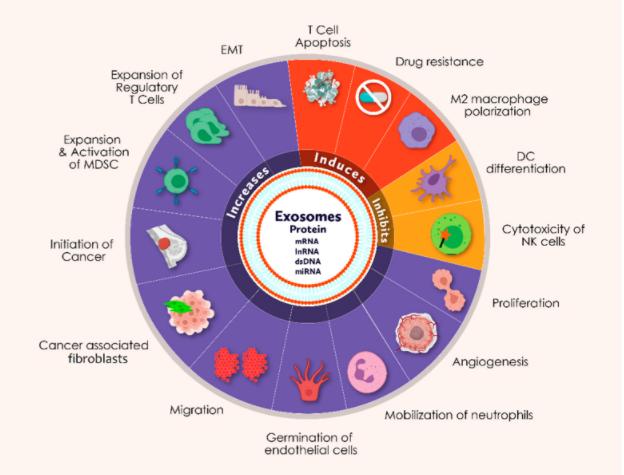Breast Cancer Exosome Research Solution
Online InquiryBreast cancer originates in the breast tissue and is the most common malignant tumor in women worldwide. Exosomes are extracellular vesicles involved in cellular communication by delivering a variety of bioactive molecules that have been noted to have the ability to alter the transcriptome of target cells and influence tumor-associated signaling pathways. As a type of intercellular communicative vector, exosomes have been extensively investigated in breast cancer biology with respect to invasion, therapeutic resistance, and the surrounding microenvironment. Based on a professional exosome multi-omics analysis platform, we can provide you with comprehensive and reliable breast cancer exosome research solutions, including proteomics, metabolomic and lipidomic analysis services.
Exosome in breast cancer
Breast cancer is a highly heterogeneous disease consisting of many different subtypes that vary in genetics, pathology, and clinical behavior. Exosomes are present in different breast cancer subtypes with a wide range of roles in breast cancer progression.
 Fig. 1 The schematic figure represents the functional abilities of exosomes that may be involved in various cellular processes during breast carcinogenesis. (Bondhopadhyay, Banashree, et al., 2021)
Fig. 1 The schematic figure represents the functional abilities of exosomes that may be involved in various cellular processes during breast carcinogenesis. (Bondhopadhyay, Banashree, et al., 2021)
- Exosomal biomarkers in breast cancer
Since circulating miRNA-loaded exosomes have a good correlation with breast cancer progression, they have been considered ideal biomarkers for this disease. There are many significant exosomal miRNAs that have been highlighted in breast cancer progressions, such as miR-21,miR-16, and miR-223. These exosomal miRNAs may critically impact breast cancer metastasis, drug resistance, immune response, and the formation of the tumor microenvironment.
- Exosomes in breast cancer aggressiveness
Tumor-derived exosomes can promote tumor cell proliferation and metastasis and play an important role in tumor invasion. In addition to promoting tumor cell viability along with extracellular matrix degradation, exosomes promote tumor-tumor communication through chemoresistance delivery. Breast cancer-derived exosomes have been reported to contain annexin A2 and have shown a compelling role in angiogenesis and organ-specific metastasis (especially in brain and lung metastasis).
- Exosomes in breast cancer drug resistance
Growing evidence that tumor cell-secreted exosome levels change in response to anticancer treatment-induced cellular stress, leading to the transfer of drug-resistant phenotypes among breast cancer cells. Therefore, apart from contributing to individualized medical or therapeutic interventions, tumor-derived exosomes can be used as non-invasive biomarkers to explore mechanisms of drug resistance in breast cancer cases.
We provide the following exosome-based services to support breast cancer exosome research, including but not limited to:
| Exosome analysis services | |
|---|---|
| Exosome isolation and purification | Sucrose gradient centrifugation |
| Polymer-based exosome enrichment method | |
| Immunomagnetic bead method | |
| Size exclusion chromatography method | |
| Exosome identification | Nanoparticle tracking analysis (NTA) |
| Electron microscopy analysis | |
| Western blot | |
| Exosome marker assay | Isolation and enrichment of exosomal CD9, CD63, CD81, TSG101, HSP70 proteins |
| Exosome surface protein identification and quantitative analysis | |
| Exosome engineering | Exosome labeling and tracking |
| Cargo loading | |
| Engineered exosome production | |
| Cargo loading assessment | |
| Exosomes labeling and tracking | Exosome fluorescent labeling |
| Fluorescence exosome purification | |
| Fluorescent exosome concentration labeling | |
| Exosome multiomics analysis | Exosome proteomics analysis: Exosome protein profile identification Exosome protein composition analysis Exosome protein expression level analysis Exosome protein differential expression analysis |
| Exosome metabolomics analysis: Exosome differential metabolite screening Qualitative and quantitative analysis of target metabolites/metabolic pathways | |
| Exosome lipidomics analysis: Exosome lipid composition and level analysis Differential expression analysis of exosomal lipid molecules Qualitative and quantitative analysis of targeted lipid molecules | |
| Exosomal biogenesis and identification | Our capabilities will provide strong support for the study of exosome biogenesis and its identification. |
| Exosomal cargo and loading mechanism | Our services can greatly help the study of exosomal cargo and loading mechanism, facilitating the diagnostic and therapeutic applications of exosomes. |
| Exosome function research | In vitro analysis of the function of exosomes In vivo analysis of the function of exosomes |
An improved understanding of the mechanism of exosomes in breast cancer may allow important therapeutic implications. Creative Proteomics offers a reliable, rapid, and cost-effective one-stop solution for multiple cancer exosome research based on highly stable, reproducible, and sensitive systems for isolation, characterization, identification, and quantitative analysis. Contact us or send us an inquiry. We look forward to serving your next project.
References
- Bondhopadhyay, Banashree, et al. "Exosomes: a forthcoming era of breast cancer therapeutics." Cancers 13.18 (2021): 4672.
- Dong, Xingli, et al. "Exosomes and breast cancer drug resistance." Cell death & disease 11.11 (2020): 1-14.
* For Research Use Only. Not for use in diagnostic procedures.



